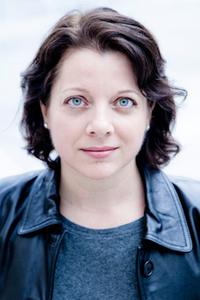 |
|
| photo: Adam Hunter | |
When Simone St. James couldn't find the kind of books she wanted to read--romantic gothic ghost stories--she decided to write them. Hence The Haunting of Maddy Claire, and St. James's career as a novelist was launched. The book won two RITA Awards from Romance Writers of America and Crime Writers of Canada's Arthur Ellis Award. St. James has continued to write ghost stories, and lives outside Toronto, Canada, with her husband and rescue cat. The Broken Girls, set at a girls school in Vermont, is her sixth novel.
Your previous novels have been set in the 1920s, but half of The Broken Girls is set in 1950. Why the change? What specifically about that time period makes it ideal for the story?
I wrote five books set in 1920s England, and while I loved writing them, I felt I had done what I wanted with that time period. Michael Connelly once said that you have to write like a shark, you have to keep moving. I never planned on writing one time period for my whole career, and my publisher agreed with me.
As for 1950, without giving anything away, I needed the historical section of the book to be set not too far past the end of World War II. I'd also been itching to set a book in the U.S. instead of the U.K. I got my wish!
Though your protagonist Fiona's life and opportunities are different from that of the Idlewild school girls, how would you say they're similar? It seems even when things change, many conventions remain the same over time, especially for women.
One of the themes of the book is that even over spans of time, women are still women. Women have specific struggles, but women also have deep-rooted strength to meet their struggles. They have survival tactics. They have strong will. At the beginning of the book, Fiona has been trapped in grief for 20 years, but she still feels the urge to keep going, to move forward, to get up even when she's down. It's that urge that women have demonstrated through all of history.
A ghost named Mary Hand reveals something personal and terrifying to each person she appears to in The Broken Girls. What would she show you?
I'm scared of a lot of things; it's why I write scary books. I figure if something scares me, there's a chance it will scare a reader, too. I loathe the idea of SCUBA diving, for example. I'm glad other people enjoy it, but I never could. I find the idea of voluntarily being underwater entirely creepy, and you don't know what's down there! I've been variously scared of my basement, my garden shed, the woods, empty rooms and dark alleys. See, Mary Hand would have an easy time with me!
Why do you like being scared, as a writer and reader?
Fear is a universal human emotion. We all feel it, and it isn't just fear of ghosts. It's the fear we feel when our child goes off to their first day of school, or when we find that mysterious lump, or when someone we love isn't answering their phone. Fiction helps us explore and map our way through it, because feeling fear is only half the experience. The other half is facing it. In a way, that's sort of what every ghost story is about, at least in my view.
You started writing romantic gothic ghost stories because you couldn't find them as a reader. What other kinds of books can't you find that you'd like to write?
Hopefully no others! I'm a one-woman genre already. But I am a voracious reader. I'll read anything. I love to read romance. That genre is on a huge creative wave right now; it's exciting to see. I love mysteries and thrillers and any kind of nonfiction. I think the most exciting books cross genres, mix literary and genre together and sort of defy definition. Which makes those books hard for publishers to market, but fun for writers and for the readers who discover them.
If you were from the future and writing a historical novel about 2017, what and who would your book be about?
Wow, tough one! I don't think I'd tackle any big historical figures. I'm not very good at that. I'd probably still write about everyday women, because that's where my creativity tends to go. I have a fascination for abandoned places: houses, hospitals, schools, theaters. There are tons of abandoned buildings around, and every one of them tells a story. There's never a shortage of ideas if you know how to look! --Elyse Dinh-McCrillis

